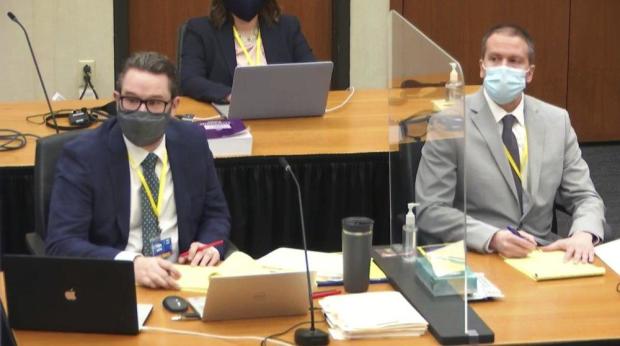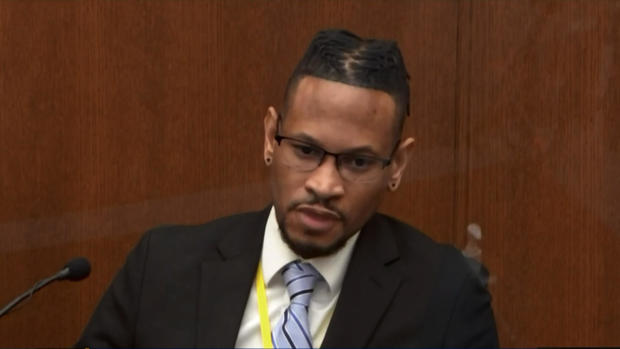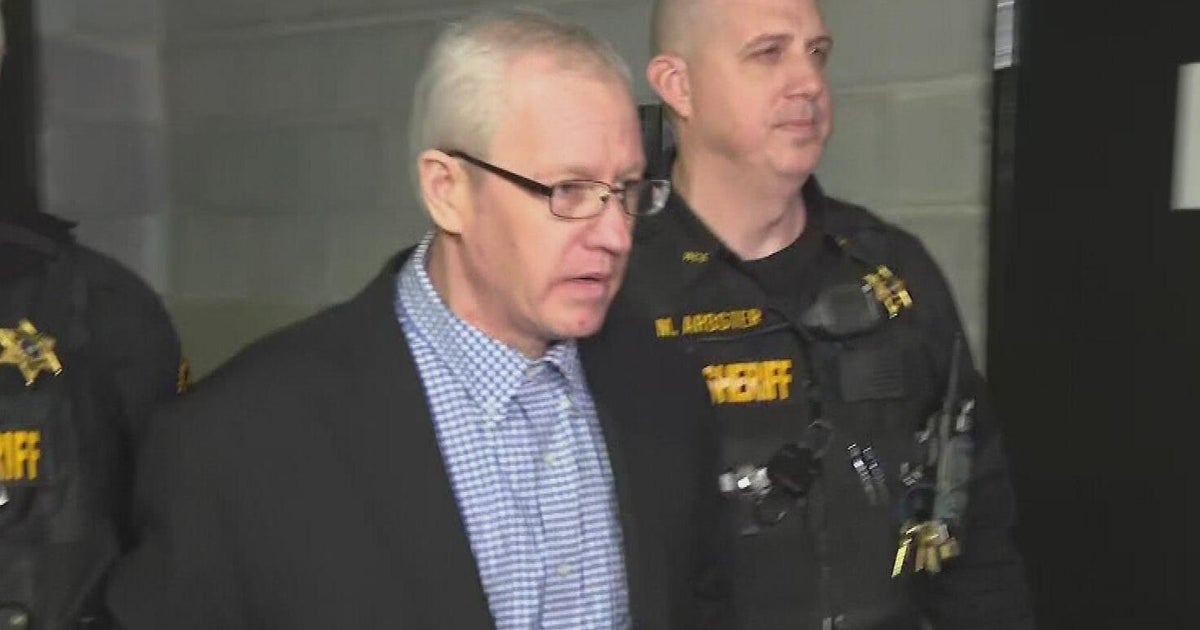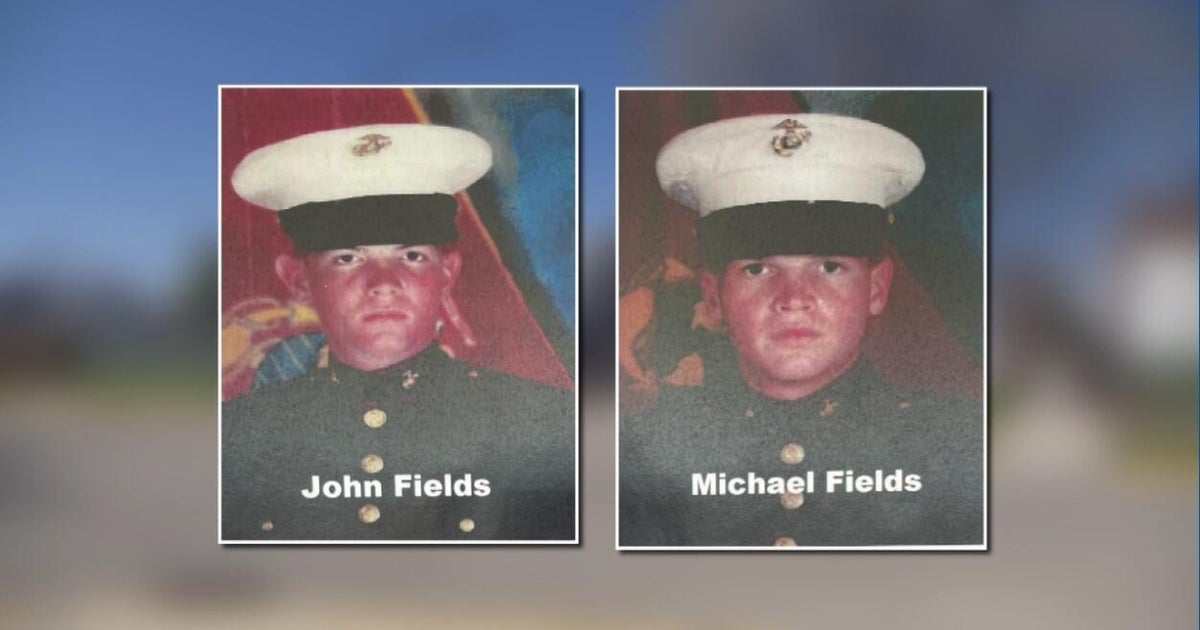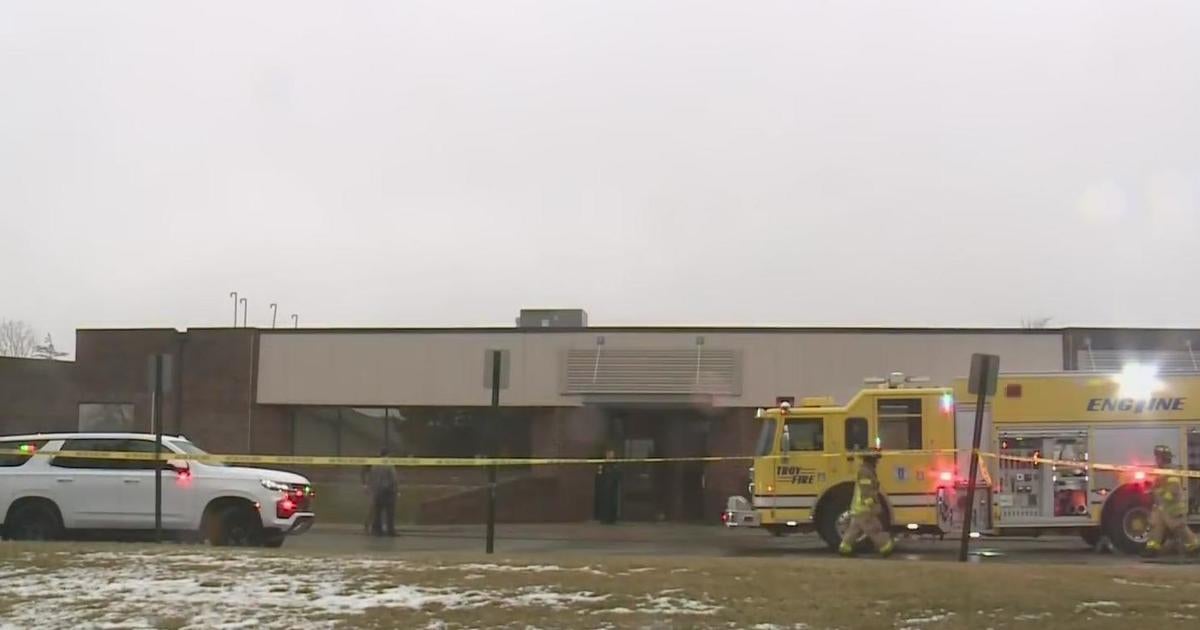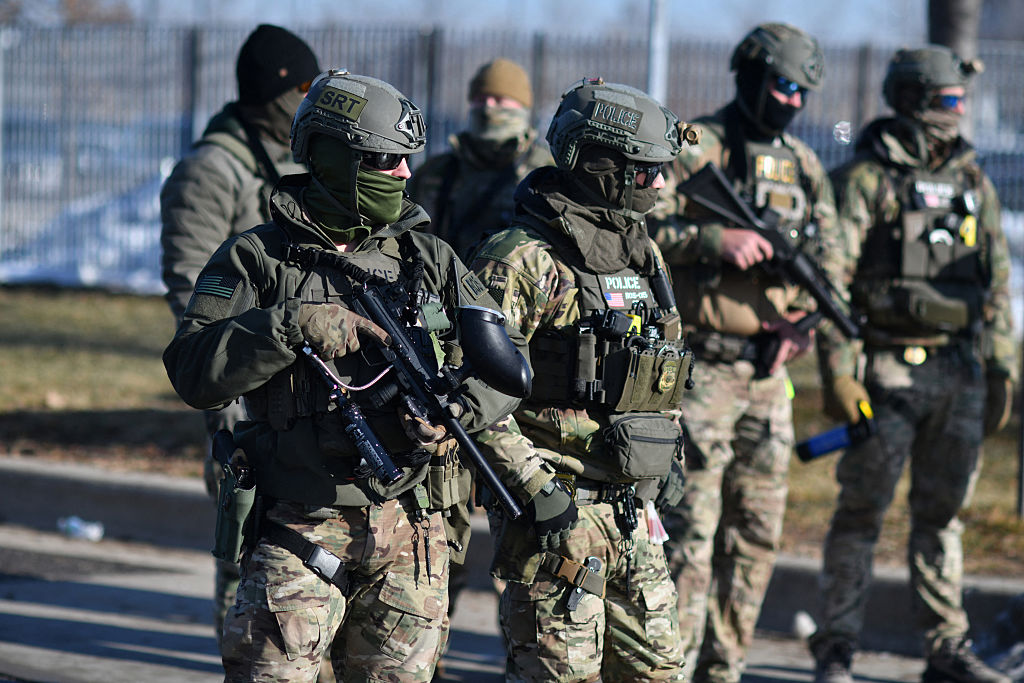Derek Chauvin Trial 4/2/21: Police lieutenant testifies officers' use of force against George Floyd was "uncalled for"
Follow the latest trial updates here. Earlier coverage is below.
A high-ranking Minneapolis police lieutenant described officers' use of force against George Floyd as "uncalled for" as he testified Friday in the trial of Derek Chauvin, the fired Minneapolis police officer charged in Floyd's death. Chauvin, who was seen in disturbing videos kneeling on Floyd's neck for more than nine minutes, is charged with second-degree murder, third-degree murder and second-degree manslaughter. He has pleaded not guilty.
Lieutenant Rick Zimmerman, who heads the Minneapolis Police Department's homicide unit, testified Friday that a knee on someone's neck should "absolutely" be considered deadly force. When asked why, he said, "Because of the fact that if your knee is on a person's neck, that can kill them."
Zimmerman said he had never been trained to use such a tactic in his decades-long career.
He described the officers' use of force as "totally unnecessary." He said he saw no reason for the officers to believe they were in danger from Floyd.
Zimmerman's testimony finished a week of raw and emotional testimony in Chauvin's trial. Judge Peter Cahill adjourned court at midday, instructing jurors to return at 9:15 am. local time Monday (10:15 a.m. ET). He had earlier indicated the proceedings were moving ahead of schedule.
Floyd's brother Philonise Floyd sat in the courtroom Friday in the lone seat reserved for members of Floyd's family. He told a pool reporter that the trial has been incredibly emotional for the family, and that he's been trying to stop crying.
On Thursday, Chauvin's police supervisor, Sergeant David Pleoger, also testified the officers' restraint against Floyd "could have ended" once the man stopped resisting. Prosecutors played a portion of the supervisor's call in court, in which Chauvin is heard saying, "We had to hold a guy down. He was going crazy... wouldn't go in the back of the squad." Pleoger said Chauvin didn't tell him on the call he had pressed his knee into Floyd's neck, only telling him later at the medical center where Floyd was pronounced dead.
The first three days of testimony included firsthand accounts of Floyd's fatal arrest from a series of eyewitnesses, some of whom cried and described feeling helpless as the unarmed Black man struggled for air. On Wednesday, jurors watched a series of police body camera videos showing the fatal encounter.
Philonise Floyd said the testimony of Charles McMillian, the bystander witness who sobbed on the stand Wednesday as he watched disturbing body camera video of the fatal encounter, was particularly emotional. George Floyd's girlfriend Courteney Ross also gave tearful testimony on Thursday.
Court adjourns after lieutenant's testimony
Judge Peter Cahill has sent the jury home for the weekend after Minneapolis Police Lieutenant Richard Zimmerman concluded his testimony.
Earlier, on cross-examination by defense attorney Eric Nelson, Zimmerman agreed that a person in handcuffs could still potentially pose a threat by kicking or thrashing. Nelson asked Zimmerman about the concept of "holding for EMS," meaning restraining a person while waiting for medical staff to arrive. On re-direct questioning, prosecutor Matthew Frank asked Zimmerman whether he saw Floyd kicking officers in the body camera video.
"No, I didn't," Zimmerman said.
Frank asked whether "holding for EMS" excuses an officer from providing medical attention or continuously reevaluating whether use of force is necessary. Zimmerman replied it did not.
Court is expected to resume Monday at 9:15 a.m. local time (10:15 a.m. ET).
Lieutenant: No reason for officers to believe they were in danger
Police Lieutenant Richard Zimmerman testified there was no reason for the officers to believe they were in danger from Floyd, and said, "that's what they would have to feel to be able to use that kind of force."
"Well first of all, pulling him down to the ground, face down, and putting a knee on his neck for that amount of time, it's just uncalled for," Zimmerman said.
When asked whether officers should have stopped restraining Floyd once he was no longer resisting, he said, "Absolutely, I would stop."
Lieutenant: "If your knee is on a person's neck, that can kill them"
Answering questions from prosecutor Matthew Frank, Richard Zimmerman said he is the head of the homicide unit and the highest ranking officer in the Minneapolis Police Department. Zimmerman responded to the scene after George Floyd was transported to the hospital. He said he arranged to have two of the officers, Lane and Kueng, transported to city hall to be questioned, and turned the scene over to the Minnesota Bureau of Criminal Apprehension.
Zimmerman answered a series of questions about his training in use of force, describing a "continuum" of force ranging from an officer's presence at a scene to deadly force. He said a knee on someone's neck should "absolutely" be considered deadly force.
When asked why, he said, "Because of the fact that if your knee is on a person's neck, that can kill them."
He said he had never been trained to use such a tactic in his decades-long career.
Zimmerman also said the threat a person poses is significantly diminished once they are in handcuffs. He described a handcuffed person as being that officer's responsibility.
"That person is yours — he's your responsibility," he said. "His safety is your responsibility, his well-being is your responsibility."
Zimmerman also said officers are trained to turn restrained individuals on their side as soon as possible so as not to restrict their breathing.
Police lieutenant takes the stand
Lieutenant Rick Zimmerman with the Minneapolis Police Department's homicide unit has taken the stand.
Night watch sergeant describes securing scene
Police Sergeant Jon Edwards testified Friday morning he is a supervisor who worked the night shift in the third precinct. Chauvin also worked in the third precinct, but worked a different shift and did not report directly to Edwards.
Edwards recalled receiving a call from Sergeant David Pleoger, Chauvin's direct supervisor, shortly after his shift began on May 25. Pleoger, who testified on Thursday, was at the hospital where George Floyd had been transported, and told Edwards that Floyd "may or may not live." Pleoger requested Edwards to go to the intersection of 38th and Chicago in south Minneapolis, where the fatal arrest happened, in order to secure the scene.
There, Edwards said he encountered officers J. Alexander Kueng and Thomas Lane, and told them both to turn on their body-worn cameras. He ordered the officers use crime scene tape to rope off the area in order to preserve evidence. He sent several other officers to canvas the area and look for additional witnesses. He told Lane and Kueng to "chill out" because he knew that escort sergeants were on the way to transport them to be interviewed about what had happened.
Edwards testified the scene was then turned over to the Minnesota Bureau of Criminal Apprehension, the agency that investigates deaths involving police in the state. He stepped down after the defense declined to cross-examine him.
Court resumes session with more law enforcement testimony
Court has resumed session. Minneapolis Police Sergeant Jon Edwards is being questioned by prosecutors.
Legal analyst on the trial so far
Key testimony from police supervisor
Derek Chauvin's former police supervisor testified Thursday that the restraint of George Floyd should have ended much sooner, rather than lasting more than nine minutes as seen on the disturbing videos. CBS News correspondent Jamie Yuccas has more of the day's most significant courtroom moments in the video below.
Earlier in the day, the jury heard from Floyd's girlfriend Courteney Batya Ross. She broke down in tears as she spoke about their relationship, saying they first met in August of 2017 at the Salvation Army where Floyd worked as a security guard. Ross described Floyd as a "mama's boy" who was devastated by his mother's death in 2018. She also described him as an active person who liked to lift weights and play sports.
Ross also described how they had both struggled with opioid drug use. She said they had each gotten addicted after being prescribed medication for chronic pain. Defense attorney Eric Nelson honed in on Floyd's drug use, asking Ross about an overdose he suffered in March 2020. Nelson also asked whether Floyd bought drugs from his friend Morries Hall, who was in the car with Floyd before his fatal arrest, including pills about a week before his death that Ross said had a strong stimulant effect. Ross said she suspected Floyd had bought the pills from Hall, but didn't know for sure.
After Ross stepped down, two paramedics took the stand, testifying about attempting to revive an unresponsive Floyd.
"He's a human being, and I was trying to give him a second chance at life," paramedic Derek Smith said.
Three other officers involved in the fatal arrest are charged with aiding and abetting, and will be tried jointly in August.
Recap of earlier testimony
Witnesses who were at the scene of George Floyd's fatal encounter with police testified Wednesday that they felt disbelief and guilt over his death. One man, Charles McMillian, broke down in tears as he watched the video and recounted his interaction with Floyd as officers tried to force him into a squad car.
Six witnesses took the stand on Tuesday. Four of them were minors at the time they witnessed the incident, including a 9-year-old girl who described what it was like to see George Floyd die while under Chauvin's knee.
The teen who filmed the widely-viewed cellphone video of the incident, Darnella Frazier, now 18, became emotional as she described seeing Floyd "suffering" and begging for his life.
"This was a cry for help, definitely," she said.
Another teenage witness who also videotaped the encounter said she could see that Floyd was "fighting to breathe" and that "time was running out, or that it had already."
The jury also heard from Donald Williams II, a bystander trained in mixed martial arts, who repeatedly yelled for for Chauvin to relieve pressure on Floyd's neck, and from firefighter and EMT Genevieve Hansen, who said police blocked her efforts to provide medical assistance.
Witnesses on Monday, the first day of testimony, included a 911 dispatcher who watched George Floyd's arrest unfold on surveillance video and called the police sergeant because "something wasn't right."
Opening statements focused on cause of death
During opening statements, prosecutors played the video showing former officer Derek Chauvin pressing his knee against George Floyd's neck for nine minutes and 29 seconds.
A key point of dispute in opening statements was how Floyd died. Prosecutors played the video of Floyd being pinned down, saying Chauvin used lethal force against a "defenseless" and handcuffed Floyd for nine minutes and 29 seconds. Prosecutor Jerry Blackwell said Floyd died of oxygen deprivation beneath the pressure of Chauvin's knee. But the defense argued Floyd died of a heart arrhythmia complicated by the fentanyl and methamphetamine he had ingested before his arrest.
